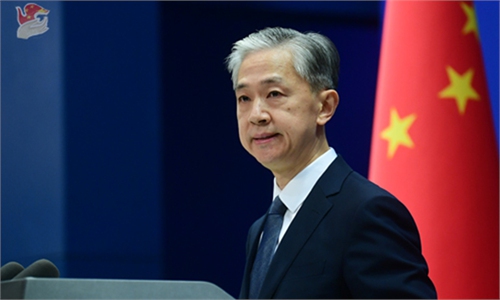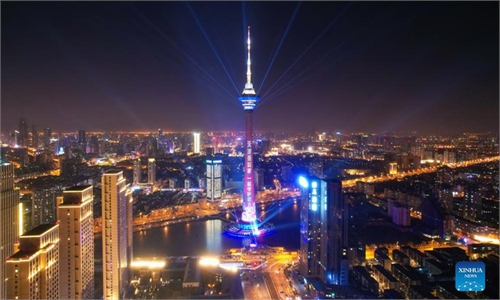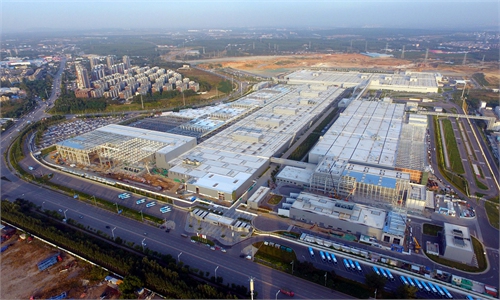
Illustration: Xia Qing/GT
An array of multinationals with operations in the Chinese market have lately revealed their fiscal disclosure for 2021, underlining the robustness of their Chinese businesses despite the bruising fallout of the COVID-19 pandemic on the global economy, notably on global supply chains.The uplifting numbers provide fresh evidence that the world's second-largest economy will always be a beacon for the world's leading businesses, even though economic globalization is no longer taken for granted in the case of the US and a number of its allies acting in cahoots with Uncle Sam.
Notably, this past year was shown to be a year of abundant harvest for multiple global pharmaceutical firms with strong presence in the Chinese market.
For the whole of 2021, British-Swedish pharmaceutical giant AstraZeneca raked in $6.01 billion in revenues in China, accounting for nearly 49 percent of its total revenues in the emerging markets. AstraZeneca's China revenues made up 16 percent of its global total for last year.
In another striking sign, China was the best-performing market for Merck, known as MSD, outside the US and Canada for 2021, with MSD's pharmaceutical sales in China soaring 60 percent to $42.62 billion.
Apart from global pharmaceutical businesses that have increasingly pinned their growth hopes on the Chinese market, multinational manufacturing and consumer goods firms are among the good news carriers that base their gloom-defying optimism built on stellar gains from their Chinese operations.
A typical example is German engineering and technology firm Bosch's exceptional performance in China over the past year. Bosch posted roughly 128 billion yuan ($20.2 billion) in its China sales in 2021, an increase of 9.1 percent compared to the year before, according to preliminary figures.
That suggests the German manufacturing conglomerate scaled a fresh high in sales revenues in China last year, after setting a record high of 117.3 billion yuan in China sales over 2020.
That Bosch is capable of continuously pushing the limits in its China market performance was fairly impressive, factoring in the prolonged COVID-19 challenges and chip shortages that have gripped global supply chains.
In a statement announcing the preliminary numbers earlier in February, Bosch voiced optimism about the Chinese economy's long-term, stable growth and vowed to continue investment in key strategic areas.
"Especially in the fields of new energy and smart mobility, Chinese market has a first-mover advantage and leads the development of industry," according to the company that has seen its China success the deciding factor for its global vision.
For Coca-Cola, its unit case volume sales in the three months ended December 2021 grew by 11 percent year-on-year in the Asia-Pacific region, buoyed robust growth in the Chinese, Indian and Philippine markets.
All these numbers ought to speak volumes for the strong appeal of the Chinese market for multinationals that has remarkably been on the rise in the face of still-raging and recurring COVID-19 outbreaks across the globe.
With the virus fallout compounded by the US-led moves to disrupt global supply chains with unruly sanctions and arbitrary controls, there's no other market than China that can effectively contain the epidemic domestically without greatly subduing its economy.
For the global business community that has been disheartened by a number of US decoupling actions, the stability of the Chinese market, as measured by its economic prospects, a continuation of opening-up, and its unrivaled response to the pandemic, has been, and will continue to be, a dose of reassurance for businesses in dire pursuit of predictability and growth potential amid a worrying volatility globally.
Instead of pulling their businesses from the Chinese market, as some anti-China conspiracy theorists have long fantasized, a host of multinationals have increasingly come to realize, and moved accordingly, that China, a promise keeper in delivering enlightening economic growth results and opening its market even wider, is an almost inexhaustible bonanza warranting continued commitments.
With a multitude of businesses, both at home and abroad, convinced by the Chinese economy's resilient strength that has consolidated its role as a global ballast and source of growth, it's hoped that the country, increasingly a hub of global investments, could bear the torch of multilateralism and light up the road to promised land for multinationals.
The author is a reporter with the Global Times. bizopinion@globaltimes.com.cn



